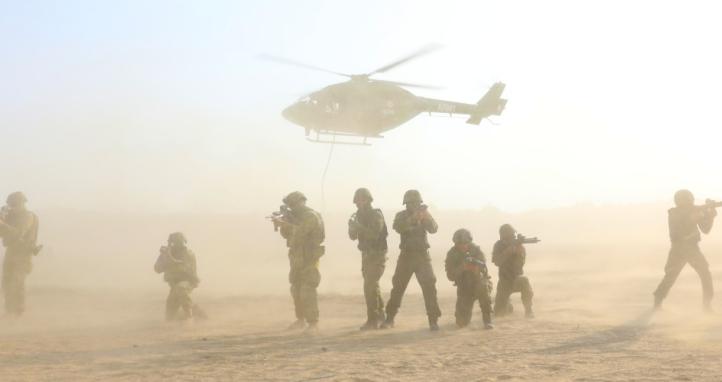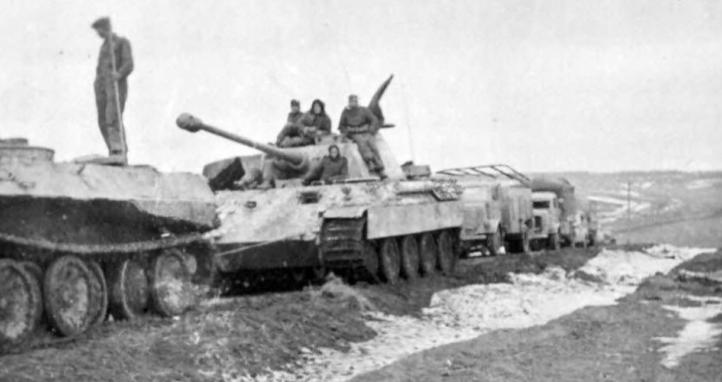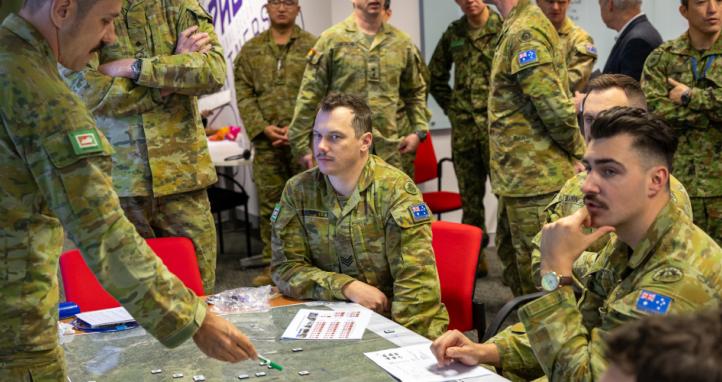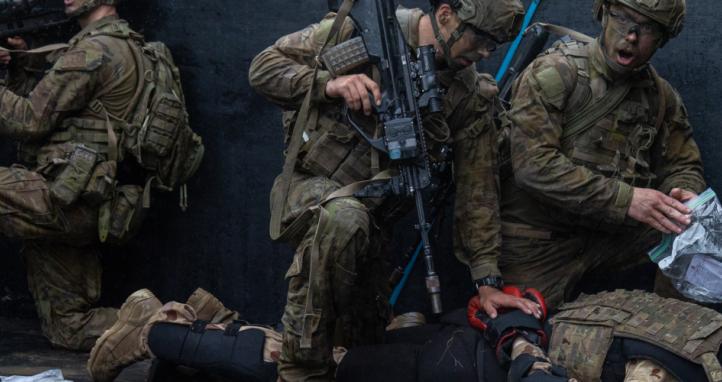Thank you for joining us for this engaging presentation by Dr Matthew Sussex.
In March 2022, when Russian airborne forces attempted to seize Kyiv through air-mobile and combined arms columns of ground forces, their elite 331st Guards Parachute Regiment quickly earned a history that no unit would ever desire. In these early moments of the war it was all but wiped out. Following the death of their commanding officer the unit flailed helplessly as it was destroyed piecemeal by Ukrainian territorial and lightly-resourced reserve forces, imposing heavy losses on an elite Russian regiment. Arguably, this early Ukrainian resistance prevented Russia’s more manoeuvrist opening gambits to remove Ukrainian political leadership, leading both sides towards the more fixed and developed defensive trench line warfare that exists today. Despite Russia committing around 80% of its ground forces to the war along with several rounds of mobilisation, Russia has still failed to generate momentum. Russia’s vaunted capabilities, including those in the cyber domain, have in reality had little to no impact. This stalemate of conflict probably exposes as much about the will of the Ukrainian people to resist as it does of the deficiencies of Russian military capability. Therefore, there is significant value in understanding how the will of a nation’s people can be maintained as well as how to protect it from being undermined or subverted through deliberate acts of espionage, influence, and sabotage.
Russia is already using diplomatic means to attempt to influence Australian decision makers, the Deputy Head of the Russian Security Council added Australia to its list of nuclear weapon targets in an attempt to sway popular and political support. However, such attempts by the Russian state upon Australia and Australians is not new, the Russians have a history of influence within Australia at a time of undeclared war. Russian, and Soviet, espionage has had a long history within Australia. It began with the first Soviet diplomatic mission in 1943 attempting to seek out information from classified sources with access to allied intelligence. That Russian pursuit has continued to this day as ASIO revealed its exposure of a Russian spy ring in 2023. However, espionage is not the only threat that foreign agents can deliver, they continue other more familiar and subtle forms of influence. Weaponising the diaspora has become a significant effort of the Russian state and it’s intelligence agencies under Putin. This type of information warfare is not new it has been well documented in NATO’s handbook on Russian Information Warfare. At one end of the influence spectrum Russian actions are long-term weakening of a target society relative to Russia in their zero-sum approach to global power and international relations. Putin’s concept of Russkjj mir or ‘Russian World’ claims all Russian speakers, those who claim Russian heritage and emigres as patriots of the Russian Federation. This recognition and expanded definition of a Russian diaspora has been passed into Russian legislation and their constitution; they argue that this justifies Russian actions abroad as the state seeks to protect themselves and this diaspora abroad. Potentially, such a weaponised diaspora, given time, exposure and penetration into the Australian psyche could diminish our capacity to defend Australia and it’s interests. It also helps to explain why a small percentage of the 98,000 individuals claiming Russian heritage within Australia actively participate in pro-Russian demonstrations. Their goals potentially being to undercut and undermine Australian support to Ukraine, reduce or diminish Australian opposition to Russian actions, as well as create divisions between Australia and the USA. These circumstances are not quite as hypothetical as we might hope.
Associate Professor Matthew Sussex from the Australian National University will shed more light on this topic on Tuesday, 26 September when he speaks at the Randwick Barracks Officers Mess, as part of the 2 DIV PME Series. The session will commence at 1630 (AEST), all ranks are welcome to attend in person, or stream online via the Cove site or Facebook page. During this session Professor Sussex will speak on his recent articles on the Russian invasion of Ukraine as well as the Ukrainian resistance. He will also build upon Kyle Wilson’s thoughts on Russian manipulation of the diaspora abroad. In doing so we can develop our understanding of how a foreign power may seek to influence Australia during a period of undeclared war. The livestream will start at 1630h (AEST) on Tuesday, 26 September 2023.
Presenter

Dr Matthew Sussex is Associate Professor (Adjunct) at the Griffith Asia Institute, Griffith University; Visiting Fellow at the Strategic and Defence Studies Centre, ANU; and Visiting Fellow at the Centre for European Studies, ANU. His research specialisations revolve around national security and strategic studies with a particular focus on Russia and Eurasia, Australian national security policy, great power politics, and information warfare. His books include The Palgrave Handbook of National Security (Palgrave, 2021); The Belt and Road Initiative and the Future of Regional Order (Lexington, 2020); Violence and the State (Manchester University Press, 2017); Power, Politics and Confrontation in Eurasia (Palgrave, 2015); Russia, Eurasia and the New Geopolitics of Energy (Palgrave, 2015); and Conflict in the Former USSR (Cambridge University Press, 2012).
Matthew has previously been Senior Fellow at the Australian Defence College; Associate Professor and Academic Director at the National Security College, Australian National University; and Head of Politics and International Relations at the University of Tasmania. He has been awarded research grants from the Australian Research Council, the Fulbright Commission, the ISA, Australian government agencies, and others. Matthew been a non-resident Fellow at the Lowy Institute for International Policy; he has served on the National Executive of the Australian Institute of International Affairs; and has been the Associate Editor of the Australian Journal of International Affairs. He is regularly invited to speak brief government, academic specialists and think tanks on his areas of expertise. He also provides frequent analyses for local, national and international media, including BBC, CNN, Bloomberg and others.
For more CoveTalks, check out The Cove’s Features.









